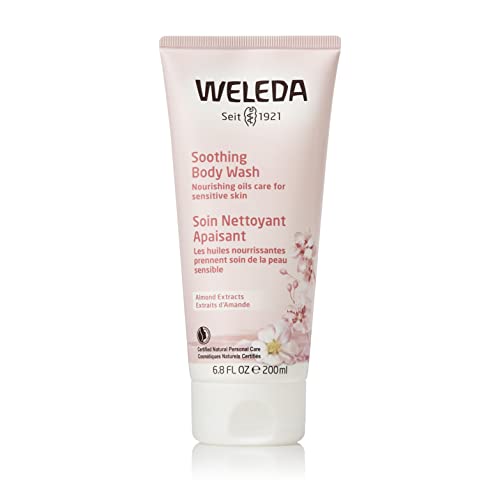
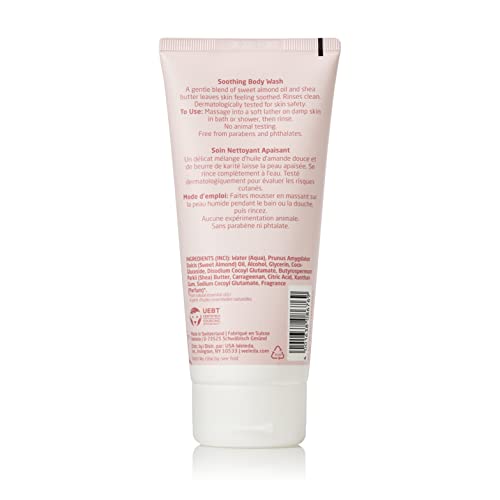
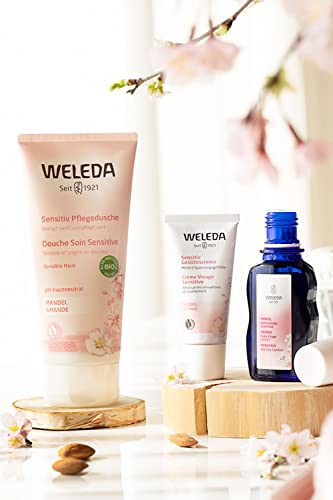
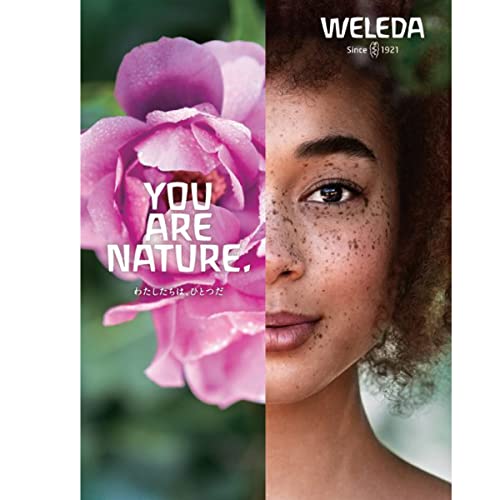
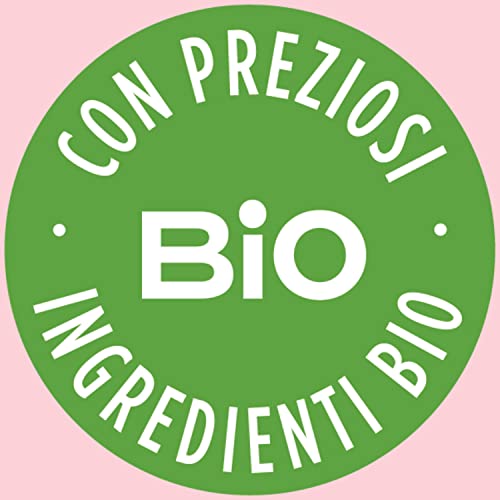
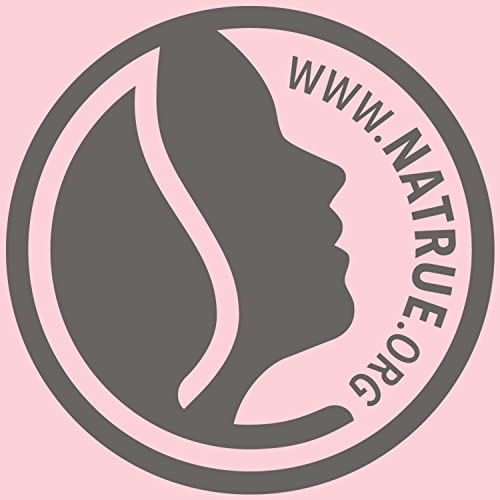

Weleda Almond Body Wash - Gentle Cleanser for Sensitive Skin, Nourishing Plant Oils - 6.8oz


Citric Acid
Medium RiskCitric acid is an alpha hydroxy acid used in personal care products primarily for its role as a pH adjuster and natural preservative. It occurs naturally in citrus fruits and is commonly utilized in various formulations for its chelating properties and mild exfoliation benefits.
Sustai Insights
Citric acid offers functional benefits as an effective preservative and pH stabilizer, contributing to product longevity and stability. It is biodegradable and derived from renewable sources. Health risks are low, with minimal concerns regarding carcinogenicity, allergies, and reproductive toxicity. However, moderate use restrictions exist due to potential irritation at high concentrations. Environmental risks are limited, as citric acid is not known to accumulate in ecosystems. Regulatory agencies have no significant advisories against its use. Overall, it is assessed as a medium-risk ingredient, with safe usage practices recommended and alternatives available.
Monosodium Glutamate
Low RiskMonosodium glutamate (MSG) is the monosodium salt of glutamic acid, an amino acid naturally found in various foods. It is primarily used as a flavor enhancer in food products, providing umami taste, which is one of the five basic tastes alongside sweet, sour, bitter, and salty.
Sustai Insights
Monosodium glutamate offers functional benefits as a flavor enhancer, effectively improving taste in various dishes. It is considered low risk regarding carcinogenicity, allergies, and reproductive toxicity, with no significant environmental hazards reported. Regulatory bodies, including the FDA, recognize its safe use. Despite common misconceptions linking MSG to adverse health effects, scientific consensus supports its safety at typical consumption levels. Therefore, the overall risk associated with monosodium glutamate is low, and it can be safely used in food products.
Water
Low RiskWater is a clear, colorless liquid essential for various biological processes. It serves as a solvent in formulations, facilitating the dissolution of other ingredients and enhancing product texture and application. Additionally, water plays a crucial role in hydration and is a key component in many cosmetic and personal care products.
Sustai Insights
Water is an effective solvent and hydrator, contributing to the texture and efficacy of formulations. It is biodegradable and generally regarded as safe, with low concerns regarding carcinogenicity, allergies, and reproductive toxicity. However, excessive water usage can lead to environmental concerns, particularly regarding resource depletion. Regulatory bodies do not impose restrictions on water use in cosmetics. Overall, the risks associated with water are low, making it a safe and essential ingredient.
Chondrus Crispus (Carrageenan)
Low RiskChondrus crispus, commonly known as carrageenan, is a gelatinous polysaccharide derived from red algae. It is primarily used as a thickening, stabilizing, and gelling agent in food, cosmetics, and pharmaceuticals, providing texture and consistency to various products.
Sustai Insights
Carrageenan offers functional benefits such as effective thickening and stabilizing properties, making it valuable in food and cosmetic formulations. It is considered to have low health risk concerns regarding carcinogenicity, allergies, and reproductive toxicity, though moderate concerns exist for non-reproductive organ toxicity. Environmental impacts are minimal, as it is not known to be bioaccumulative or a significant pollutant. Regulatory bodies have not issued specific restrictions against its use, affirming a low overall risk assessment for this ingredient. Alternatives like agar-agar or pectin may be considered for those seeking substitutes.
Vegetarian Glycerin
Low RiskVegetarian glycerin, also known as glycerol, is a colorless, odorless, and viscous liquid derived from plant sources. It is primarily used as a humectant, solvent, and emollient in various personal care products, helping to retain moisture and improve texture.
Sustai Insights
Vegetarian glycerin offers functional benefits as an effective humectant, promoting hydration and skin smoothness. It is biodegradable and typically sustainably sourced. Health risks associated with glycerin are low, with no significant concerns for carcinogenicity, allergens, or reproductive toxicity. Environmental risks are minimal, and it is not subject to major regulatory warnings. Overall, the risk level for this ingredient is low, making it a safe choice in formulations. Safe usage practices include ensuring proper concentrations in products, and alternatives such as propylene glycol exist but may have differing properties.
Sodium Cocoyl Glutamate
Low RiskSodium cocoyl glutamate is a sodium salt of glutamic acid, derived from coconut oil. It serves primarily as a surfactant and mild cleansing agent in cosmetic formulations, contributing to the product's ability to remove dirt and oil while being gentle on the skin.
Sustai Insights
Sodium cocoyl glutamate offers functional benefits as a surfactant, enhancing cleansing efficacy without excessive irritation. It is considered low risk regarding health concerns, including carcinogenicity and allergenic potential. Regulatory assessments indicate no significant environmental hazards or restrictions. Overall, it is a low-risk ingredient, suitable for use in personal care products, with no notable adverse effects or regulatory warnings.
Butyrospermum Parkii (Shea) Butter
Low RiskButyrospermum parkii (shea) butter is a vegetable fat derived from the nuts of the shea tree. It is commonly used in cosmetic formulations for its emollient properties, providing moisture and improving skin texture. Additionally, shea butter is known for its ability to enhance the stability of products and deliver a creamy texture.
Sustai Insights
Shea butter offers functional benefits as an effective moisturizer, enhancing skin barrier function and texture. It is sustainably sourced and biodegradable, contributing to eco-friendliness. Health-wise, it is associated with low risks for carcinogenicity, allergies, and reproductive toxicity. Environmental impacts are minimal, with no significant pollutant potential identified. Regulatory assessments indicate no current restrictions. Overall, the ingredient presents a low risk, making it a favorable choice in cosmetic formulations.
Corylus (Hazelnut) Oil
Low RiskCorylus (hazelnut) oil is derived from the nuts of the hazel tree. It is primarily used in cosmetic and skincare products for its emollient properties, providing moisture and enhancing skin texture. The oil is rich in fatty acids and vitamins, contributing to its function as a skin conditioning agent.
Sustai Insights
Corylus (hazelnut) oil offers functional benefits as a moisturizer and skin conditioner while being biodegradable and potentially sustainably sourced. Health risks are low, with minimal concerns related to carcinogenicity, allergenic potential, or reproductive toxicity. Environmental impacts are also low, with no known bioaccumulation issues. Regulatory status shows no restrictions. Overall, the ingredient is assessed as low risk, with safe usage practices recommended and no significant alternatives noted.
Xanthan Gum
Low RiskXanthan gum is a polysaccharide, a sugar-based compound produced by the fermentation of glucose or sucrose. It is commonly used as a thickening agent and stabilizer in various food and cosmetic products due to its ability to improve texture and prevent ingredient separation.
Sustai Insights
Xanthan gum serves effectively as a thickener and stabilizer, enhancing product texture and consistency. It is biodegradable and typically derived from renewable sources, supporting sustainability efforts. Health risks are minimal, with low concerns regarding carcinogenicity, allergies, and reproductive toxicity. Environmental impact is similarly low, posing no significant hazards. Regulatory agencies, including the FDA, regard it as safe for use, with no significant restrictions. Overall, xanthan gum is assessed as low risk, making it a suitable ingredient in formulations.
Monosodium Glutamate
Low RiskMonosodium glutamate (MSG) is the monosodium salt of glutamic acid, an amino acid naturally found in various foods. It is primarily used as a flavor enhancer in food products, providing umami taste, which is one of the five basic tastes alongside sweet, sour, bitter, and salty.
Sustai Insights
Monosodium glutamate offers functional benefits as a flavor enhancer, effectively improving taste in various dishes. It is considered low risk regarding carcinogenicity, allergies, and reproductive toxicity, with no significant environmental hazards reported. Regulatory bodies, including the FDA, recognize its safe use. Despite common misconceptions linking MSG to adverse health effects, scientific consensus supports its safety at typical consumption levels. Therefore, the overall risk associated with monosodium glutamate is low, and it can be safely used in food products.
Water
Low RiskWater is a clear, colorless liquid essential for various biological processes. It serves as a solvent in formulations, facilitating the dissolution of other ingredients and enhancing product texture and application. Additionally, water plays a crucial role in hydration and is a key component in many cosmetic and personal care products.
Sustai Insights
Water is an effective solvent and hydrator, contributing to the texture and efficacy of formulations. It is biodegradable and generally regarded as safe, with low concerns regarding carcinogenicity, allergies, and reproductive toxicity. However, excessive water usage can lead to environmental concerns, particularly regarding resource depletion. Regulatory bodies do not impose restrictions on water use in cosmetics. Overall, the risks associated with water are low, making it a safe and essential ingredient.
Chondrus Crispus (Carrageenan)
Low RiskChondrus crispus, commonly known as carrageenan, is a gelatinous polysaccharide derived from red algae. It is primarily used as a thickening, stabilizing, and gelling agent in food, cosmetics, and pharmaceuticals, providing texture and consistency to various products.
Sustai Insights
Carrageenan offers functional benefits such as effective thickening and stabilizing properties, making it valuable in food and cosmetic formulations. It is considered to have low health risk concerns regarding carcinogenicity, allergies, and reproductive toxicity, though moderate concerns exist for non-reproductive organ toxicity. Environmental impacts are minimal, as it is not known to be bioaccumulative or a significant pollutant. Regulatory bodies have not issued specific restrictions against its use, affirming a low overall risk assessment for this ingredient. Alternatives like agar-agar or pectin may be considered for those seeking substitutes.
Vegetarian Glycerin
Low RiskVegetarian glycerin, also known as glycerol, is a colorless, odorless, and viscous liquid derived from plant sources. It is primarily used as a humectant, solvent, and emollient in various personal care products, helping to retain moisture and improve texture.
Sustai Insights
Vegetarian glycerin offers functional benefits as an effective humectant, promoting hydration and skin smoothness. It is biodegradable and typically sustainably sourced. Health risks associated with glycerin are low, with no significant concerns for carcinogenicity, allergens, or reproductive toxicity. Environmental risks are minimal, and it is not subject to major regulatory warnings. Overall, the risk level for this ingredient is low, making it a safe choice in formulations. Safe usage practices include ensuring proper concentrations in products, and alternatives such as propylene glycol exist but may have differing properties.
Sodium Cocoyl Glutamate
Low RiskSodium cocoyl glutamate is a sodium salt of glutamic acid, derived from coconut oil. It serves primarily as a surfactant and mild cleansing agent in cosmetic formulations, contributing to the product's ability to remove dirt and oil while being gentle on the skin.
Sustai Insights
Sodium cocoyl glutamate offers functional benefits as a surfactant, enhancing cleansing efficacy without excessive irritation. It is considered low risk regarding health concerns, including carcinogenicity and allergenic potential. Regulatory assessments indicate no significant environmental hazards or restrictions. Overall, it is a low-risk ingredient, suitable for use in personal care products, with no notable adverse effects or regulatory warnings.
Butyrospermum Parkii (Shea) Butter
Low RiskButyrospermum parkii (shea) butter is a vegetable fat derived from the nuts of the shea tree. It is commonly used in cosmetic formulations for its emollient properties, providing moisture and improving skin texture. Additionally, shea butter is known for its ability to enhance the stability of products and deliver a creamy texture.
Sustai Insights
Shea butter offers functional benefits as an effective moisturizer, enhancing skin barrier function and texture. It is sustainably sourced and biodegradable, contributing to eco-friendliness. Health-wise, it is associated with low risks for carcinogenicity, allergies, and reproductive toxicity. Environmental impacts are minimal, with no significant pollutant potential identified. Regulatory assessments indicate no current restrictions. Overall, the ingredient presents a low risk, making it a favorable choice in cosmetic formulations.
Corylus (Hazelnut) Oil
Low RiskCorylus (hazelnut) oil is derived from the nuts of the hazel tree. It is primarily used in cosmetic and skincare products for its emollient properties, providing moisture and enhancing skin texture. The oil is rich in fatty acids and vitamins, contributing to its function as a skin conditioning agent.
Sustai Insights
Corylus (hazelnut) oil offers functional benefits as a moisturizer and skin conditioner while being biodegradable and potentially sustainably sourced. Health risks are low, with minimal concerns related to carcinogenicity, allergenic potential, or reproductive toxicity. Environmental impacts are also low, with no known bioaccumulation issues. Regulatory status shows no restrictions. Overall, the ingredient is assessed as low risk, with safe usage practices recommended and no significant alternatives noted.
Citric Acid
Medium RiskCitric acid is an alpha hydroxy acid used in personal care products primarily for its role as a pH adjuster and natural preservative. It occurs naturally in citrus fruits and is commonly utilized in various formulations for its chelating properties and mild exfoliation benefits.
Sustai Insights
Citric acid offers functional benefits as an effective preservative and pH stabilizer, contributing to product longevity and stability. It is biodegradable and derived from renewable sources. Health risks are low, with minimal concerns regarding carcinogenicity, allergies, and reproductive toxicity. However, moderate use restrictions exist due to potential irritation at high concentrations. Environmental risks are limited, as citric acid is not known to accumulate in ecosystems. Regulatory agencies have no significant advisories against its use. Overall, it is assessed as a medium-risk ingredient, with safe usage practices recommended and alternatives available.
Xanthan Gum
Low RiskXanthan gum is a polysaccharide, a sugar-based compound produced by the fermentation of glucose or sucrose. It is commonly used as a thickening agent and stabilizer in various food and cosmetic products due to its ability to improve texture and prevent ingredient separation.
Sustai Insights
Xanthan gum serves effectively as a thickener and stabilizer, enhancing product texture and consistency. It is biodegradable and typically derived from renewable sources, supporting sustainability efforts. Health risks are minimal, with low concerns regarding carcinogenicity, allergies, and reproductive toxicity. Environmental impact is similarly low, posing no significant hazards. Regulatory agencies, including the FDA, regard it as safe for use, with no significant restrictions. Overall, xanthan gum is assessed as low risk, making it a suitable ingredient in formulations.
Experience the gentle cleansing power of Weleda Soothing Almond Body Wash, specially formulated for sensitive skin. Enriched with sweet almond oil, this mild cleanser balances moisture while leaving your skin feeling silky soft and delicately scented.
- Gentle Cleansing: Formulated to cleanse without irritation, perfect for sensitive skin types.
- Moisture Balance: Helps maintain skin's natural moisture levels, preventing dryness and irritation.
- Natural Ingredients: Free from synthetic compounds; made with plant extracts and essential oils for a soothing experience.
- Rich in Plant Oils: Nourishes the skin deeply, promoting a calm and refreshed feeling.
- Easy Application: Simple to use in your shower routine for a luxurious bath experience.
Make the switch to a body wash that cares for your skin and the planet, fostering a nurturing and ethical self-care routine.
Subscribe & Save with Sustai
- Best Price Guarantee: Always enjoy the lowest prices on sustainable home essentials.
- No Surprises: We’ll notify you before shipping. No hidden fees, ever.
- You’re in Charge: Change, pause, or cancel your subscription anytime with ease.
- Eco-Friendly Deliveries: Our grouped shipments mean less packaging and lower emissions.
Join us on a sustainable journey. Special offers for a limited time! Prices and promotions may change.
Recommended Products
Experience the gentle cleansing power of Weleda Soothing Almond Body Wash, specially formulated for sensitive skin. Enriched with sweet almond oil, this mild cleanser balances moisture while leaving your skin feeling silky soft and delicately scented.
- Gentle Cleansing: Formulated to cleanse without irritation, perfect for sensitive skin types.
- Moisture Balance: Helps maintain skin's natural moisture levels, preventing dryness and irritation.
- Natural Ingredients: Free from synthetic compounds; made with plant extracts and essential oils for a soothing experience.
- Rich in Plant Oils: Nourishes the skin deeply, promoting a calm and refreshed feeling.
- Easy Application: Simple to use in your shower routine for a luxurious bath experience.
Make the switch to a body wash that cares for your skin and the planet, fostering a nurturing and ethical self-care routine.

You can have at most 2 Sustainable Steals products in your cart
Customer Reviews
Customers’ View
Customers appreciate the gentle formulation of Weleda's Almond Body Wash, noting its effectiveness for sensitive skin and delivering a smooth, silky feel. Many users highlight the body wash's moisturizing properties, with one customer stating, "My skin feels smooth. I like the smell, did a nice job." However, feedback on the scent is mixed, with some enjoying the mild almond fragrance while others find it lacking. Additionally, several customers express disappointment regarding the product's lathering ability, suggesting it does not produce enough foam for their preference. Some also feel the price does not align with the product's performance, indicating it may not be the best value for money. Overall, the product's gentle, plant-based ingredients resonate with health-conscious consumers, although improvements in lather and scent consistency could enhance user satisfaction.
AI-generated from the text of customer reviewsThis product is rated 5.0 of 5.0 stars.
It has received 3 reviews.




